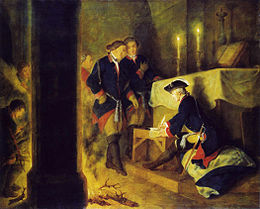Battle of Torgau
| Battle of Torgau | |||||||||
|---|---|---|---|---|---|---|---|---|---|
| Part of Seven Years' War | |||||||||
 Frederick the Great after Torgau, by Bernhard Rode |
|||||||||
|
|||||||||
| Belligerents | |||||||||
|
|
|
||||||||
| Commanders and leaders | |||||||||
| Frederick II of Prussia | Leopold Daun | ||||||||
| Strength | |||||||||
| 50,000 | 53,400 | ||||||||
| Casualties and losses | |||||||||
| 16,670 | 11,697, 49 guns | ||||||||
In the Battle of Torgau on 3 November 1760, King Frederick the Great's Prussian army fought a larger Austrian army under the command of Field Marshal Leopold Josef Graf Daun. The Prussians won a costly victory in one of the bloodiest battles of the Seven Years' War.
In August, Daun missed an opportunity to destroy the main Prussian army in Silesia. Outnumbered three-to-one, Frederick escaped the Austrian trap by smashing the corps of Feldzeugmeister Ernst Gideon Freiherr von Laudon at the Battle of Liegnitz. When the Prussians lingered in Silesia, their more numerous enemies attacked. Feldzeugmeister Franz Moritz Graf von Lacy's 18,000 Austrians joined with General Tottleben's Russian force near Berlin, making a total of 35,000 allies. While 13,000 Prussians took refuge in the Spandau fortress, Lacy and Tottleben captured 3,000 Prussians in Berlin on 9 October.
In late October, Daun slipped out of Silesia and moved west to Saxony where Lacy joined him with his corps. When his government ordered him to stand and fight the Prussians, Daun selected a position on the Süptitzer Höhen (Heights) just west of Torgau.
The plateau had been used by Prince Henry of Prussia in 1759 and was protected on the west by abatis and on the south by a small stream. The Austrians faced south with Lacy's corps nearest Torgau and Daun's army further west. Altogether, Daun and Lacy marshalled 42,000 infantry, 10,000 cavalry, and 275 cannons.
Frederick determined to send General Hans Joachim von Zieten to hold Daun's attention from the south, while his main effort circled around the western end of the Austrian line to attack from the north.
...
Wikipedia
